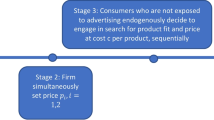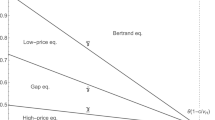Abstract
The aim of this paper is to consider the implications of Internet advertising, for prospective consumer welfare gains/losses. The implications of imperfect information among buyers are discussed to highlight the role of intermediaries and search agents in enhancing consumer welfare in a world of complex products and uncertainty. The argument demonstrates that despite possessing welfare enhancing potential the retailing of complex products on the Internet increases the scope for price discrimination among sellers. Hence, buyers may pay different prices for the same product/services. The paper shows how “agents” may restrict this type of market failure if they possess the ability to search all databases. That the Internet intrinsically exhibits welfare enhancing and reducing characteristic a game model is develop to show how entry of new sellers may proceed or be checked by incumbents.
Similar content being viewed by others
References
Admati, A. and M. Perry. (1987). “Strategic Delay in Bargaining.” Review of Economic Studies 54, 345–364.
Bailey, J. and E. Brynjolfsson. (1997). “In search of friction-free markets: An exploratory analysis of prices for books, CDs and software sold on the Internet.” In Proceedings of the 25th Telecommunications Policy Research Conference, Alexandria, VA.
Bakos, Y. (1998). “Internet Economics: The Emerging Role of Electronic Marketplaces on the Internet.” Communications of the ACM 4(8), 35–42.
Binmore, K. (1985). “Bargaining and Coalitions.” In A.E. Roth (ed.), Game Theoretic Models of Bargaining. Cambridge: Cambridge Univ. Press.
Chatterjee, K. and L. Samulson. (1987). “Bargaining with Two-Sided Incomplete Information: An Infinite.” Comanor, W. and T.Wilson. (1967). “Advertising, Market Structure and Performance”. Review of Economics and Statistics 49, 423–440.
Friedman, J.W. (1977). Oligopoly Theory. Cambridge University Press.
Hotelling, H. (1929). “Stability in Competition.” Economic Journal 39, 41–47.
IAB, Internet Advertising Revenue More than Double in 1998-Fourth Quarter Exceeds $600 Million, $1.92 Billion Reported for 1998. http://www.iab.net/news/content/1998results.html (1999).
Kreps, D. (1990). A Course in Microeconomic Theory, Chapters 3 and 16. Harvester.
Kreps, D. (1991). Game Theory and Economic Modelling. Oxford University Press.
Kreps D. and R. Wilson (1982). “Reputation and Imperfect Information.” Journal of Economic Theory 27, 253–279.
Lambin, J. (1976). Advertising, Competition and Market Conduct in Oligopoly over Time. Amsterdam: North-Holland.
Ling, M. (1998). “Advertising Resources Over Time: A Strategic & Empirical Analysis.” Knowledge Transfer-An International Journal 1(1), 19–30.
Ling, M. and K. Lawler. (1999). “Internet Advertising, Internet Retail Price Strategies and Search Costs.” In Proceedings of Business and Economics Society International (B&ESI) Conference, Canary Island, Spain.
Ling, M., K. Lawler, A. Moscardini, and N. McBain. (1997). “Economics of Advertising: Emerging Functions of Internet Advertising.” In Proceedings of First Berlin Internet Workshop, Berlin, Germany.
Ling, M., K. Lawler, A. Moscardini, and N. McBain. (1999). “Economics of Advertising: Emerging Functions of Internet Advertising.” Netnomics 1, 127–136.
Milgrom, P. (1987). “Auction Theory.” In T. Bewley (ed.), Advances in Economic Theory, Fifth World Congress, Econometric Society Monographs, Vol. 12. Cambridge: Cambridge University Press.
Myerson, R. (1981). “Optimal Auction Design.” Mathematics of Operations Research 6, 58–63.
Nairn, G. (1999). “A Vision of “Virtual Commerce” Communities.” Financial Times, FT-IT Review 2, 1 January.
Nelson, P. (1978). “Advertising as Information once More.” In D.G. Tuerck (ed.), Issues in Advertising. Washington, DC: American Institute for Public Policy Research, pp. 133–160.
Nelson, P. (1974). “Advertising as Information.” Journal of Political Economy 81, 729–754.
Riley, J. and W. Samuelson. (1981). “Optimal Auctions.” American Economic Review 7, 381–392.
Schmalensee, R. (1972). The Economics of Advertising. Amsterdam: North-Holland.
Smith, C. (1989). Auctions: The Social Construction of Value. London: The Free Press.
Smith, L. and D. Levin. (1994). “Equilibrium in Auctions with Entry.” American Economic Review 84, 585–599.
Smith, L. and D. Levin. (1996). “Optimal Reservation Prices in Auctions.” Economic Journal 106, 1271–1283.
Stigler, G. (1961). “The Economics of Information.” Journal of Political Economy 72, 213–225.
Taylor R. (1999). “Sales Growth Drives Internet Stocks.” Financial Times 38, 28 January.
Telser, L. (1964). “Advertising and Competition.” Journal of Political Economy 72, 537–562.
Tett G. (1999). “World Stock Market: Fund Piles Weight.” Financial Times.
Vulkan, N. (1999). “Economic Implications of Agent Technology and E-commerce.” Economic Journal 109, 67–90.
Yovovich, B. (1995). “Smart Agents do the Shopping.” Advertising Age 8, 31 July.
Author information
Authors and Affiliations
Rights and permissions
About this article
Cite this article
Ling, M.Ch., Lawler, K. Internet Advertising, Game Theory and Consumer Welfare. Electronic Commerce Research 1, 169–181 (2001). https://doi.org/10.1023/A:1011535915274
Issue Date:
DOI: https://doi.org/10.1023/A:1011535915274




